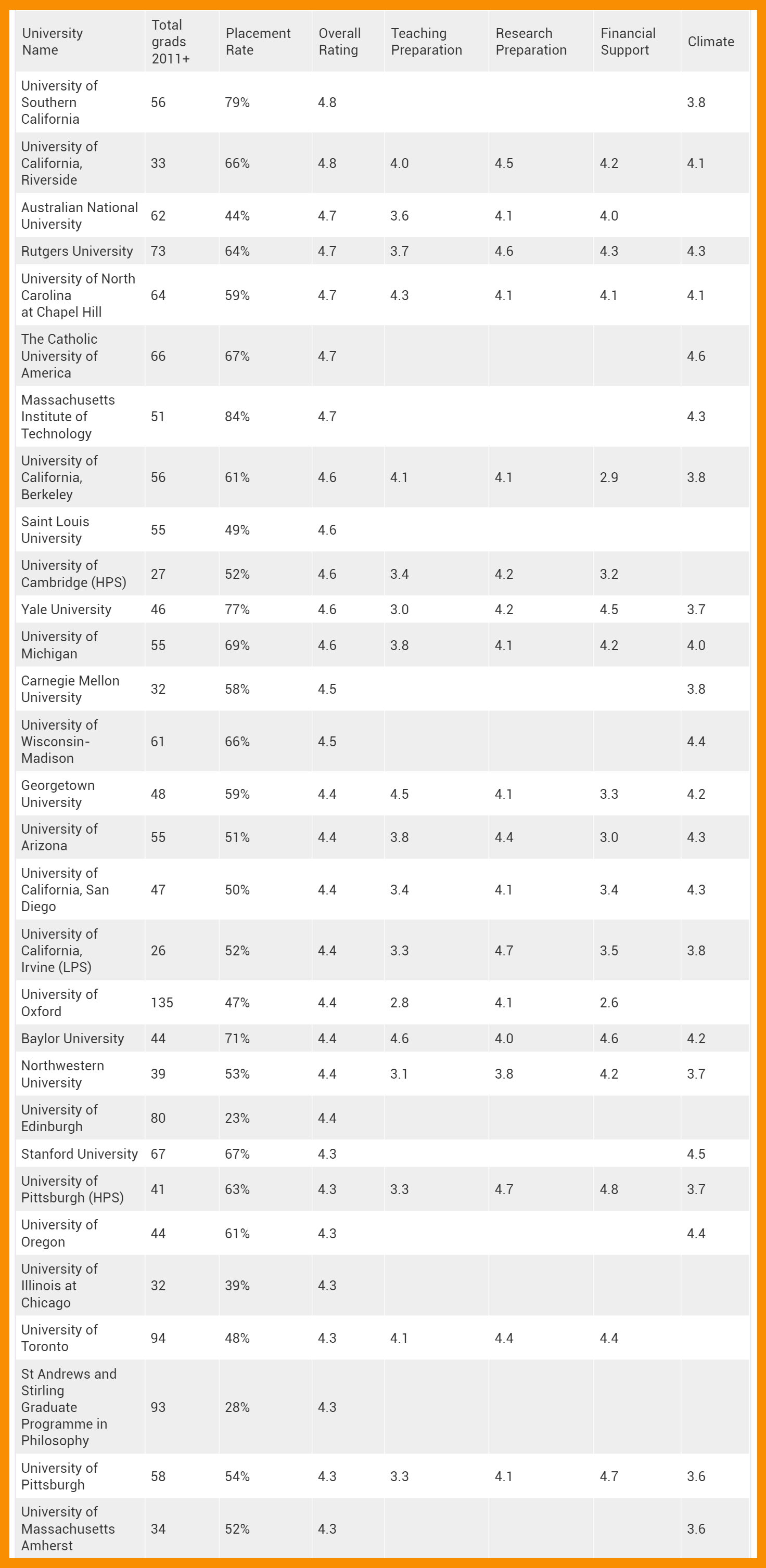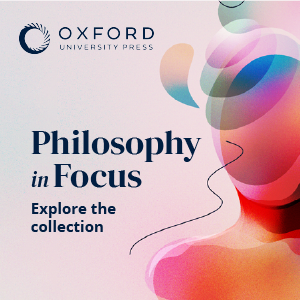Top 30 Philosophy PhD Programs According to APDA
Academic Placement Data and Analysis (APDA), which collects data about and produces a ranking of PhD programs in philosophy, has recently posted details about the top 30 programs on its ranking, including comments about the programs from the students.
The rankings are based on overall student ratings of programs. Entries for each program note several additional factors, including research preparation, teaching preparation, financial support, and climate. Job placement data is also included, as are keywords frequently used to describe each program.
For an example, below are the entries on the philosophy programs at the University of North Carolina, Chapel Hill (ranked 5th) and at Georgetown University (ranked 15th):
5) University of North Carolina at Chapel Hill
Keywords chosen by past graduates/current students:
Analytic, Ancient, Contemporary, Early Modern, Epistemology, Ethics, Historical, History and Philosophy of Science, Metaphysics, Mind, Political
Average program ratings by graduates 2011 and later or current students:
4.7 overall rating (definitely would recommend)
4.3 teaching preparation (satisfied)
4.1 research preparation (satisfied)
4.1 financial support (satisfied)
4.1 program climate (satisfied)
Job placement of graduates 2011 and later:
64 total, 35 in permanent academic jobs, 5 in non-academic jobs (59% placement rate)
Student Comments on Program Overall:
Community of graduate students; collegiality and availability of faculty; location; overall strength of university; broad strengths of the faculty; strong financial support
Faculty engaged and deeply committed. Friendly, inclusive student climate.
Faculty invested in graduate student success. Rigorous academic environment. Excellent graduate student peers. Opportunities for academic engagement beyond the classroom and research, especially through the PPE program and Parr Center for Ethics.
Friendly and collegial faculty and fellow grad students. Cooperative and supportive environment. Teaching and service opportunities abound.
Friendly atmosphere; Supportive faculty; Great university
Good community of scholars. Strong professional support, e.g. on job market.
Good education, good professional connections, awful climate for grad students, especially for women.
My fellow graduate students were the best aspect of the program: I made some wonderful friends. It was not a competitive environment; I was able to do my work while maintaining a healthy, balanced lifestyle.
Overall strength of the program; congeniality of the faculty; positive atmosphere among the graduate students; adequate funding; good location; lots of structure to the program; ample teaching opportunities
Strength of faculty; location; strength and reputation of university; culture and community within department; well though-out graduate program; opportunities for teaching and research; good funding
Strong mentoring by faculty, collegial environment among graduate students. Focus on both expert domain knowledge and breadth of philosophical training in coursework and per-dissertation seminars.
The faculty were extremely supportive, the graduate student climate was lively and non-competitive, and I received good training in an array of areas.
The program emphasizes providing graduate students with a rigorous general education in mainstream contemporary analytic philosophy and the history of Western philosophy (though not other philosophical traditions). The program is thus highly structured and involves many requirements. While some find these requirements to be onerous, I have generally found them to be valuable and intellectually enriching. Graduate students have many opportunities to teach their own courses as the instructor of record, and there is a strong community of graduate students who are interested in teaching and philosophy pedagogy. Between the philosophy department and the affiliated Parr Center for Ethics and PPE (Philosophy, Politics, and Economics) Program, there are an abundance of interesting events to attend.
When I was there the most successful students were working on three topics: philosophy of science, ethics, and early modern philosophy. political philosophy did pretty well too. The other topics had good people, but success rates for their students were lower. But there has been a fair bit of faculty turnover since I was there, so it is hard to say much about how things stand now. But I can say that [Name removed] was amazing. [They] made sure we had an actual placement program that actually prepared people for the job market.
15) Georgetown University
Keywords chosen by past graduates/current students:
Analytic, Applied, Bioethics/Medical Ethics, Continental, Epistemology, Ethics, Gender/Feminist, German, Interdisciplinary, Phenomenology, Pluralist, Political, Pragmatism
Average program ratings by graduates 2011 and later or current students:
4.4 overall rating (somewhat likely to recommend)
4.5 teaching preparation (very satisfied);
4.1 research preparation (satisfied);
3.3 financial support (neutral);
4.2 program climate (satisfied)
Job placement of graduates 2011 and later:
48 total, 22 in permanent academic jobs, 11 in non-academic jobs (59% placement rate)
Student Comments on Program Overall:
Congenial environment, supportive and engaged faculty, large and pluralistic department.
Having an underdog mentality, the department tries harder than many on placement. Consequently (mixing metaphors) it punches above its weight.
Helpful, Warm, Nurturing. They will go the extra miles to help you succeed
I was able to pursue my research interests but also given good strategic advice about which courses to take/specializations to pursue to prepare myself for the job market. The program provided a vibrant graduate student community and more or less adequate financial support for a single person to live in DC. I also had good access to professionalization activities like conferences and workshops as well as teaching training. I feel that the program prepared me well to become a professional academic.
Pluralistic faculty that gets along. Supportive, thoughtful environment. Excellent placement preparation.
Rigorous. Pluralist. Respectful. Supportive. Caring.
The faculty provided excellent training in normative and applied ethics. The program is closely affiliated with an ethics center that offered more resources and provided opportunities for interdisciplinary collaborations.
Warm, supportive, heterogenous, diverse
The details on all 30 programs in the top quartile of APDA’s rankings are here.
A table of the top quartile rankings is available here and is reproduced below:

Other data from APDA is available here.


